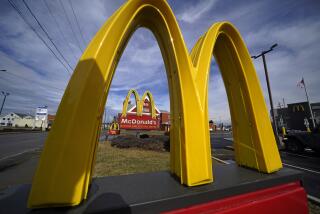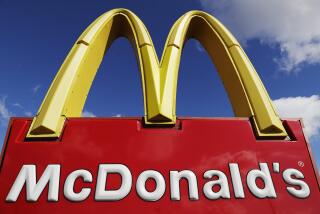McDonald’s Warns Press on ‘Poison’ Ad : Fast food: The firm says running the piece without its response will be considered ‘malicious.’
- Share via
McDonald’s Corp. has aimed its big legal gun at major newspapers that printed a consumer ad accusing the fast-food chain of contributing to the “poisoning of America” with cholesterol-laden burgers and fries.
The company acknowledged Friday that it had its lawyer--Jimmy Carter’s secretary of Health, Education and Welfare--write a letter of warning to the New York Times, Wall Street Journal, USA Today and about a dozen other papers that on April 4 ran the ad sponsored by the National Heart Savers Assn. The letter warns that reprinting the ad without McDonald’s corrections would be considered malicious, according to newspaper ad executives who saw it.
The letter was written by Joseph A. Califano Jr., now a prominent Washington attorney who represents the Oak Brook, Ill., company on food and nutrition matters. McDonald’s spokesman Chuck Ebeling said the company would not release the letter, but described its contents. He said the message is that the Heart Savers’ ad contains numerous factual errors and is malicious.
“The ad is reckless. We felt that the ad was maliciously calculated to inflict injury on McDonald’s. The ad was published without regard to the truthfulness of it,” Ebeling said.
The letter describes the errors, Ebeling said. For example, he said, McDonald’s fries are cooked in a mixture of beef tallow and vegetable oil, not just beef tallow as the ad said.
“It is not just a question of a point of view. There are a lot of blatant errors,” he said. Still, McDonald’s is also upset about the tone of the ad, which Ebeling said implies that the company has been irresponsible about consumer health, Ebeling said. Such an assertion is “an outrageous lie,” he added. He said the chain “has been and is acting responsibly in the area of nutrition,” in introducing low-fat milkshakes, cereals and grilled chicken sandwiches.
“For over 15 years we have been providing full nutritional information on everything we serve,” he added.
Before running such an ad again, McDonald’s wants newspapers to check with the company first about the accuracy of material, Ebeling said.
Some newspaper representatives said Califano’s letter wouldn’t in and of itself prevent them from running the ad again.
“When ads come in, we look at them,” said Wall Street Journal spokesman Roger May. “We have the right to reject any ad we believe inaccurate. But we can’t check every fact. It just is not practical. We had no reason to believe that anything in this was not accurate,” he said.
Since the issue of accuracy has been raised, May said, if the ad were submitted again, the Journal would check the facts very carefully. “We would probably ask for substantiation. We don’t want to knowingly print any inaccurate information,” he added.
Pat Haegele, USA Today’s senior vice president for advertising, said the Gannett Inc. newspaper as a matter of routine submitted the ad to its lawyers before it was accepted. The newspaper gets a lot of issue-oriented ads and its policy is to submit each for legal review. “What we look at is obvious liability for us,” she said, and since the ad was accepted, the lawyers obviously didn’t see a liability for the paper. “From our perspective,” she said, “we don’t agree or disagree with the ad.”
Califano’s letter has been turned over to the legal staff for review, she said.
Although some newspapers refused to run the ad, Ebeling said McDonald’s had sent or would send a note on the issue to the major publications anyway.
The Los Angeles Times declined to run the ad, saying it considered it unfair and feared legal liability. Legal and advertising representatives at the Times said Friday that they had not seen a letter from McDonald’s, but it could have been addressed to any of several executives and hadn’t yet surfaced.
The object of McDonald’s’ ire is actually Phil Sokolof of Omaha, Neb., who is the only known member of the Heart Savers’ group. A wealthy businessman, Sokolof says he pays for the full-page ads out of his own pocket.
The McDonald’s ad is the third of a series. Some food companies last year switched to vegetable oils after Sokolof attacked the use of tropical oils--coconut and palm--to make cookies and other snack foods. A survivor of a heart attack 23 years ago that he blames on high cholesterol and saturated fats, Sokolof has been campaigning against the standard American diet that is heavy in animal fats and dairy products.
Despite the stern, legalistic message that McDonald’s sent the newspapers, Sokolof said Friday that his conversation with the company about his ad was cordial. McDonald’s said it also is on the side of good nutrition and raised no threats, he said.
Instead of addressing the real issues of why beef tallow is used at all in cooking fries and why it doesn’t reduce the fat content of its hamburgers, Sokolof said, “McDonald’s has chosen to try and intimidate the nation’s leading newspapers.”
Celebrated First Amendment lawyer Floyd Abrams said that if McDonald’s has proof of inaccuracies in the ad, it has a right to seek legal remedies. If, however, the ad contains no inaccuracies, the company may simply be trying to intimidate newspapers, which could raise First Amendment concerns.
More to Read
Inside the business of entertainment
The Wide Shot brings you news, analysis and insights on everything from streaming wars to production — and what it all means for the future.
You may occasionally receive promotional content from the Los Angeles Times.








